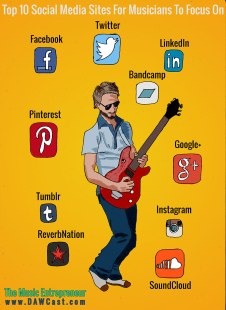The innovations related to music production and sales have changed the music business for a majority of musicians and their fans. Traditionally, music users discovered songs or albums through radio play and word-of-mouth (Dewan & Ramaprasad, 2014). However, as Mangold and Faulds (2009) point out, social media has become an extension of those traditional means. Social media reaches hundreds or thousands of people instead of a handful of friends, thereby drastically increasing the visibility of an artist. Not only is social media used for sharing information about music songs and albums, but the music itself is shared through social media, often for a very low cost (Dewan & Ramaprasad, 2014).
It is difficult to compare sales and marketing of record production companies and mainstream music to the surge of independent artists now recording and producing their own music, then marketing it on social media. Dewan and Ramaprasad (2014) conducted a study based on the context of traditional music industry. They note that music has two characteristics that contributed to the disruption of the industry – music is both an information good and an experience good. Thus, music is shareable and can be broken away from the album format. This allows music to be shared and sampled through social media and other new technologies. Noting a decline in music industry sales, the study measured blog buzz, or blog posts related to an album or song. Although a narrower measure than social media such as Facebook, the results did correlate with online music activity such as Amazon music sales ranks, showing the blog buzz to be a reliable overall measure of social media music interaction. Their findings propose that the relationship between social media and sales of the single song sales is negative. I do not fully agree with their findings, as they primarily examined music through a traditional lens focused on album or song sales, rather than exposure.
Granted, the numbers for industry sales may reflect negative progress, but the independent artists now on the charts of various social media webpages demonstrate a market that did not previously exist. Musicians can now record their own mp3s, upload them to a social media site, and market their own music. Bands now enjoy a more regional popularity, which is reflected on several sites such as Bandcamp. In his blog, The Music Entrepreneur, David Weibe (2015) lists 10 important social media sites for musicians. Of the 10, which included business networking sites such as LinkedIn and Google+, four stand out to me as a means for marketing mp3 music – Facebook, Bandcamp, SoundCloud, and ReverbNation.

Facebook, in addition to personal social pages, offers Musician/Band pages, which has pages such as “About” the band, and pages for sound links (Bandpage), events, photos, and videos. Music can be streamed or shared, but not downloaded. Bandcamp (https://bandcamp.com/) caters to three user communities – fans, artists, and labels. Music can be streamed free, purchased for download, uploaded for sales, or promoted to labels participating on the site. With plentiful filters for searching, Bandcamp even lists the top artists for a particular region. SoundCloud (https://soundcloud.com/) also has a premium subscription account, but the free account allows streaming music. Their collection consists of many music genres, including classical and art music. This makes is a good choice for composers of contemporary western art music, in addition to popular genres. ReverbNation (https://www.reverbnation.com/), which primarily offers popular genres of music, such as rock, hip hop or country, features promotional tools for artists. It heavily promotes local music, shows, and artists. ReverbNation has free levels of membership, but also has premium subscription account.
In the midst of rapidly expanding innovations for music, social media, and technology, the former model of sales, marketing, and music by record companies and studios should no longer be solely considered as an accurate measure. Many musicians that I have read about or talked to now say that concert/show sales, rather than music songs/albums/mp3s are responsible for generating income. Thus, an examination of bands that perform in various venues and the attendance may demonstrate the shift, along with an evaluation of how social media impacts the promotion of concerts and events. Also to be considered are counts of streaming music, which demonstrate the appeal to listeners.
I am headed over to ReverbNation now, to explore the bands of the Knoxville music scene…maybe I will catch a show this weekend.
References
Dewan, S., & Ramaprasad, J. (2014 March). Social media, traditional media, and music sales. MIS Quarterly 38(1), 101-121.
Mangold, W. G., & Faulds, D. J. (2009). Social media: The new hybrid element of the promotion mix. Business Horizons 52, 357-365.
Wiebe, D. (2015, May 15). Top 10 social media sites for musicians to focus on [infographic]. The Music Entrepreneur (blog). http://dawcast.com/top-10-social-media-sites-for-musicians-to-focus-on-infographic/.

The music industry spent so much money fighting Napster, illegal download etc… I feel like if they embraces the direction on music innovation and evolved with programs like spotify earlier they would have saved a lot of money
LikeLike
I agree with you! I think the traditional music industry still feels threatened by the innovations of new artists, but I am glad to see so many musicians finding a way to put their music out. Now they just need a way to generate a little more income!
LikeLike